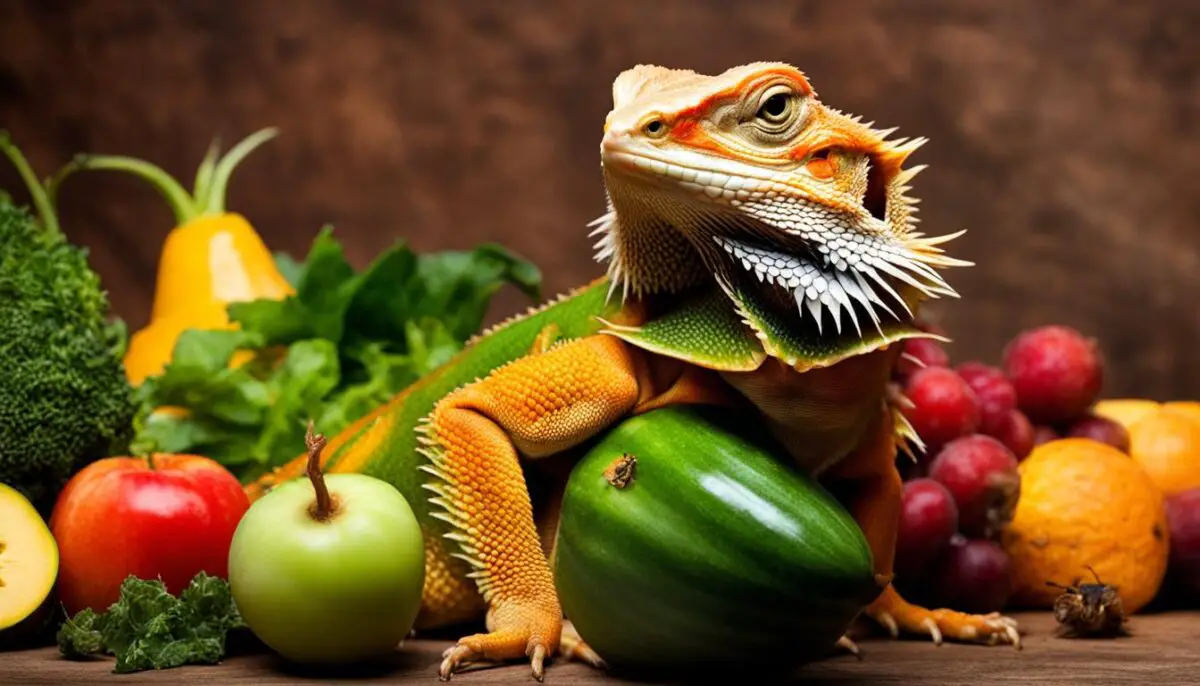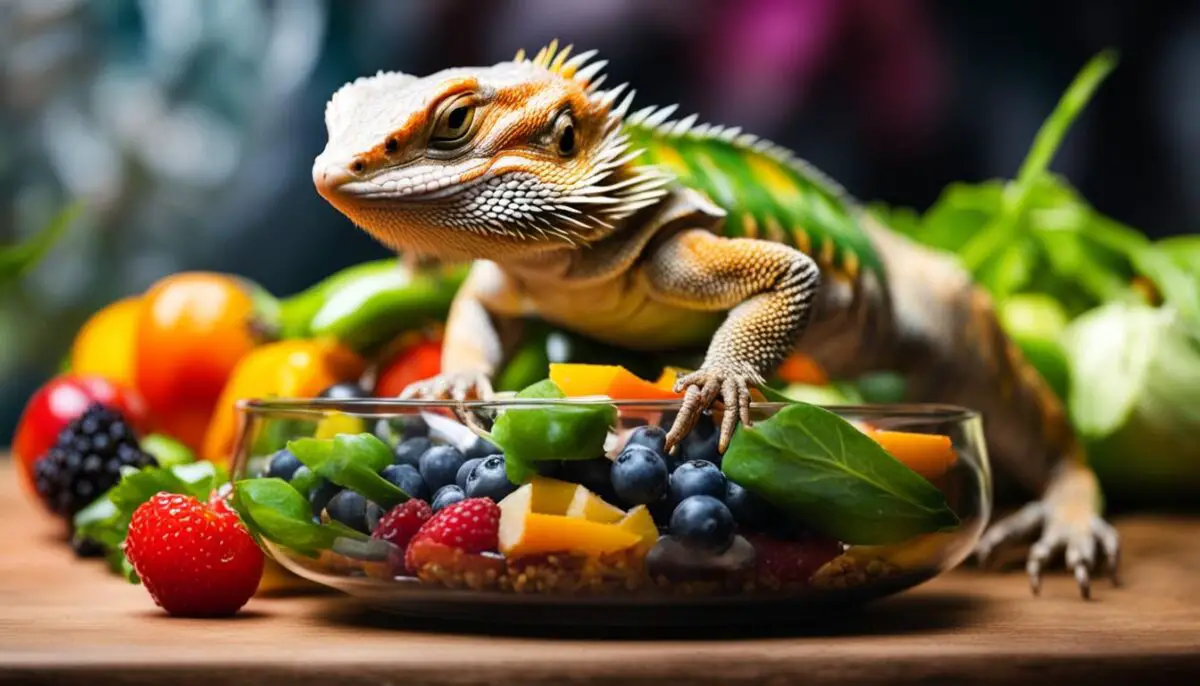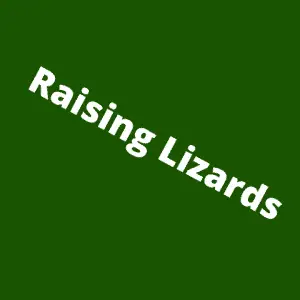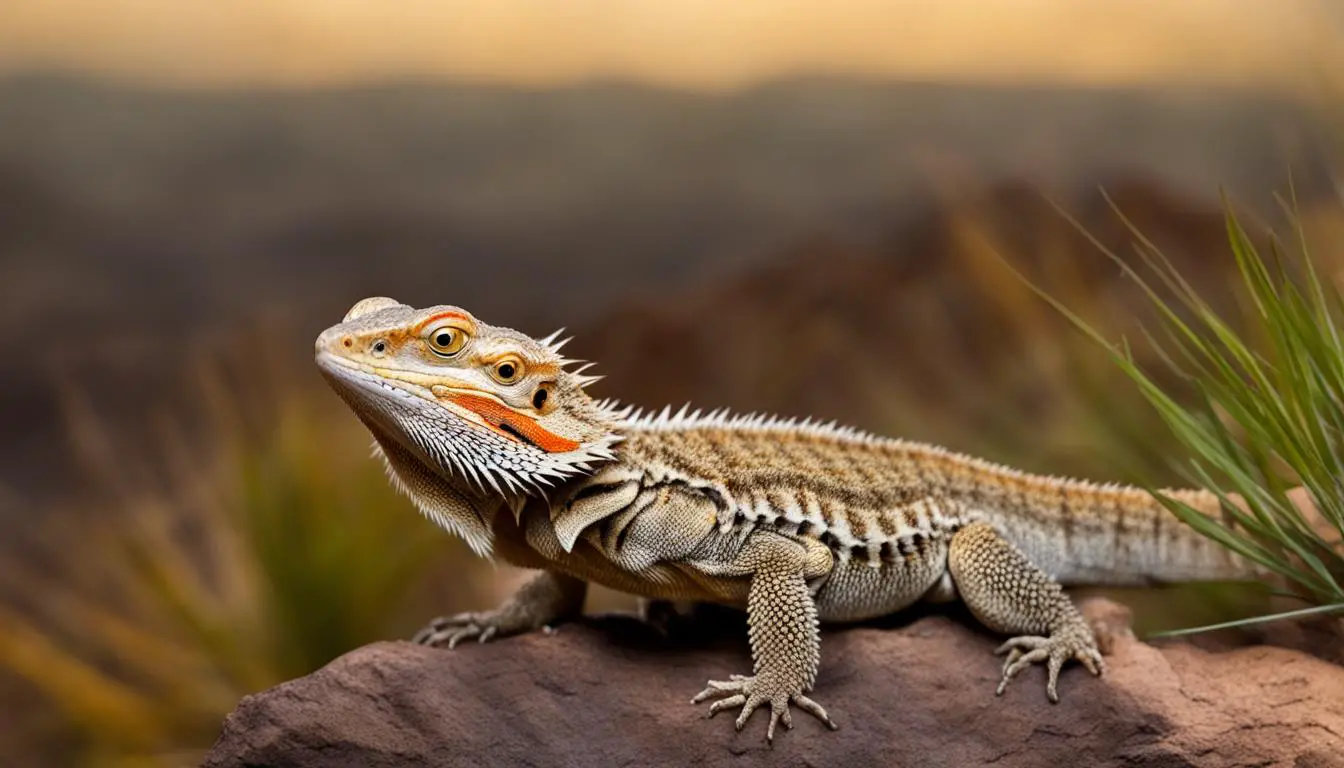Bearded dragons are fascinating creatures known for their unique appearance and friendly demeanor. If you’re considering getting a bearded dragon as a pet or already have one, it’s important to understand their dietary needs. What do these reptiles love to eat? Let’s explore the bearded dragon diet and discover the best food options to keep them healthy and happy.
Key Takeaways:
- Bearded dragons are omnivores, meaning they can eat both plants and animals.
- Their diet should consist of a variety of live insects, such as crickets, mealworms, and superworms.
- Vegetables like kale, squash, and bell peppers should also be included in their diet.
- Fruits like apples and strawberries can be given as occasional treats.
- The ratio of insects to plants in their diet varies based on their age; baby dragons need more insects, while adults require more plants.
What Do Bearded Dragons Eat?
Bearded dragons, as omnivores, have a diverse diet that includes a combination of insects, vegetables, and fruits. In the wild, these fascinating reptiles consume a variety of food sources to ensure a balanced intake of nutrients for their overall health and well-being.
As pet owners, it is crucial to provide a well-balanced diet for our bearded dragons to replicate their dietary needs and maintain optimal health. An ideal diet for adult bearded dragons consists of approximately 80% plants and 20% insects, whereas baby dragons may have a higher percentage of insects in their diet.
When it comes to insects, live options such as crickets, mealworms, and roaches are popular choices as they provide essential protein. These insects can be easily obtained from pet stores or online sources. It is recommended to gut load these insects by feeding them nutritious food before offering them to your dragon, ensuring that they receive a wholesome meal.
In addition to insects, vegetables play a vital role in a bearded dragon’s diet. A variety of vegetables like kale, squash, bell peppers, and carrots should be offered to provide essential vitamins and minerals. These vegetables contribute to the overall well-being of your dragon and help meet their nutritional requirements.
Fruits can be given as occasional treats to bearded dragons. Safe options include apples, strawberries, and grapes. However, fruits should be fed in moderation due to their high sugar content. Remember, having a balanced diet is key, and an excessive amount of fruits can negatively impact the health of bearded dragons.
It is essential to consult with a veterinarian who specializes in reptiles to determine the specific dietary needs of your bearded dragon. Factors such as age, size, and individual health conditions should be taken into consideration while planning their diet. A professional can provide tailored guidance to ensure your dragon receives the best food sources to thrive and live a healthy life.

| Insects | Vegetables | Fruits |
|---|---|---|
| Crickets | Kale | Apples |
| Mealworms | Squash | Strawberries |
| Roaches | Bell Peppers | Grapes |
How Much Should I Feed My Bearded Dragon?
Feeding your bearded dragon the right amount of food is essential for their health and wellbeing. The quantity of food to give your dragon depends on their age and size. Juvenile dragons should be fed twice a day, while adult dragons may require less frequent feedings.
When it comes to the ratio of insects to plants in their diet, it also varies based on age. Baby dragons may need a higher percentage of insects, around 80%, and 20% plants, while adult dragons should have a diet consisting of 80% plants and 20% insects.
When feeding live insects to your dragon, it’s best to provide them with a specific feeding time. Let them eat as much as they want within that time period. After the designated feeding time, remove any uneaten insects to prevent overfeeding and potential mold growth.
As for fruits and vegetables, it’s important to leave them in the enclosure for approximately 30 minutes. This helps avoid overfeeding and the growth of mold. Make sure to monitor your dragon’s weight and adjust their feeding schedule as needed to maintain a healthy weight.
Remember, each bearded dragon is unique, so it’s crucial to pay attention to their specific dietary needs and consult with a veterinarian if you have any concerns or questions.

Bearded Dragon Feeding Guidelines:
- Juvenile dragons should be fed twice a day.
- Adult dragons may require less frequent feedings.
- For baby dragons, the diet should consist of around 80% insects and 20% plants.
- Adult dragons should have a diet consisting of 80% plants and 20% insects.
- Feed live insects for a specific time period and remove any uneaten insects.
- Leave fruits and vegetables in the enclosure for approximately 30 minutes.
- Monitor your dragon’s weight and adjust their feeding schedule if needed.
By following these feeding guidelines, you can ensure that your bearded dragon receives the appropriate amount of food for their age and size, leading to a healthy and happy dragon.
Best Foods for Your Bearded Dragon
Bearded dragons have specific dietary needs and there are certain foods that are best for them. When it comes to live insects, crickets, mealworms, and roaches are popular choices due to their nutritional value and availability. It is important to gut load these insects with nutritious food before feeding them to your dragon. For vegetables, bearded dragons can safely eat a variety of options such as kale, squash, bell peppers, and carrots. These vegetables provide essential vitamins and minerals. Fruits can be given as occasional treats and some safe options include apples, strawberries, and grapes. It is important to provide a diverse diet for your dragon to ensure they receive all the necessary nutrients for their overall health and wellbeing.
| Category | Food | Nutritional Benefits |
|---|---|---|
| Live Insects | Crickets | Rich in protein and fiber |
| Mealworms | Good source of protein and fat | |
| Roaches | High in protein and low in fat | |
| Vegetables | Kale | High in calcium and vitamins A, C, and K |
| Squash | Rich in vitamins A, C, and B6 | |
| Bell Peppers | Excellent source of vitamins A and C | |
| Carrots | Full of beta-carotene and vitamins B, C, and K | |
| Fruits | Apples | Contains vitamin C and dietary fiber |
| Strawberries | Rich in vitamin C and antioxidants | |
| Grapes | Good source of vitamin C and hydration |
Conclusion
Feeding your bearded dragon a balanced diet is crucial for their overall health and wellbeing. By providing a diverse range of live insects, vegetables, and fruits, you can ensure that your dragon receives all the necessary nutrients they need to thrive.
It is important to consider your bearded dragon’s age when determining the ratio of insects to plants in their diet. Younger dragons may require a higher percentage of insects, while adult dragons should have a higher percentage of plants.
Regularly monitoring your dragon’s feeding schedule and adjusting it as needed is essential for maintaining a healthy weight and preventing issues such as obesity. Consult with a veterinarian to ensure you are offering the best food options for your bearded dragon based on their individual needs.
Following these guidelines and providing a nutritious and satisfying diet will keep your bearded dragon healthy, happy, and thriving. Remember, proper nutrition is key to ensuring a long and vibrant life for your scaly friend.
FAQ
What do bearded dragons like to eat?
Bearded dragons are omnivores and enjoy a varied diet of live insects, vegetables, and fruits.
What is the best food for bearded dragons?
The best food for bearded dragons includes live insects like crickets, mealworms, and roaches, as well as a variety of vegetables such as kale, squash, and bell peppers.
What can I feed my bearded dragon?
You can feed your bearded dragon live insects like crickets, mealworms, and roaches, along with a selection of vegetables like kale, squash, and bell peppers, as well as occasional fruits like apples and strawberries.
How much should I feed my bearded dragon?
The amount of food to feed your bearded dragon depends on their age and size. Juvenile dragons should eat twice daily, while adult dragons may eat less frequently. The ratio of insects to plants in their diet also differs based on age.
What are the best foods for my bearded dragon?
The best foods for your bearded dragon include live insects like crickets, mealworms, and roaches, as well as a variety of vegetables such as kale, squash, and bell peppers. It is important to provide a diverse diet to meet their nutritional needs.


